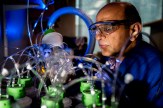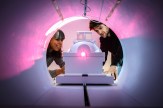Northeastern University Tests Building Collapse as Part of International Competition for Engineers and Students
2007 Progressive Collapse Resistance Competition Tests how Predictions Stack Up to Reality
Earthquakes and explosions can lead to the destruction of buildings, but unless the collapse is immediate, initial damage to load-bearing parts may not affect the entire structure. Civil engineers have long been speculating as to how concrete structures might behave following the removal of a column for instance, but Northeastern University professor Mehrdad Sasani and his team decided to test and see for themselves how predictions match up with what actually happens. In order to make it a learning experience for others too, they organized an international educational competition inviting dozens of universities and professional organizations from across the U.S. and Canada.
Titled Progressive Collapse Resistance Competition (PCRC2007), the event aims to provide undergraduate and graduate students, as well as professionals, with an opportunity to learn about progressive collapse resistance of reinforced concrete structures.
“It is an exceptional opportunity for academia, industry, and even the engineering experts judging the competition, to watch and learn how real structures respond to damage,” said Sasani, an Assistant Professor of Civil & Environmental Engineering at Northeastern University. “The overwhelming response from universities, engineers and architects suggests that the industry is eager to develop new ways to build structures that can withstand multiple hazards and save people’s lives.”
The ultimate goal of this educational event – building better buldings and saving lives -is consistent with Northeastern’s emphasis on interdisciplinary research that addresses societal needs.
As part of the competition, participants are expected to predict the response of a small scale 2-D physical model of an RC structure, following predefined initial damage. The model was built by Sasani’s team and is located inside an engineering lab on Northeastern campus. During step one of the experiment, a glass column of the model will be shattered, therefore removing a load-bearing element of the three-story structure. As a second step, should the structure stay upright, weights hung from the beams replicating the weight of the building will be pulled downward several times throughout one of the experiment days to test whether the structure can withstand the tension.
Competing teams, including 10 U.S. and 3 Canadian universities, as well as several engineering firms, must have submitted their predictions prior to the experiment as to how the structure might respond to the initial damage. They compete in two categories; Level 1 includes undergraduate student and Level 2 is comprised of graduate students and professionals.
The two-step experiment will be carried out on Thursday, November 29th and Friday, November 30th at Northeastern University’s College of Engineering and every stage will be webcast throughout those days.
Winners of the competition will be revealed after the judges reviewed the submissions against the results of the experiments, on February 29th, 2008. Prizes ranging from $1000 to $8000 and the award ceremony will be held April 25th, 2008 at the Structures Congress in Vancouver, Canada.
The National Science Foundation (NSF) supports Sasani’s research and educational activities through a career award for the multi-hazard progressive collapse analysis of structures. The Concrete Reinforcing Steel Institute and FM Global are major sponsors of PCRC2007, with additional support from the Northeast Cement Shippers Association, the Portland Cement Association, the Reinforced Concrete Construction Committee, and Simpson Gumpertz & Heger, Inc. Support is also provided by the Northeastern University.
For more information about the 2007 Progressive Collapse Resistance Competition, please visit www.pcrc2007.neu.edu and contact Renata Nyul at r.nyul@neu.edu or at 617-373-7424.
About Northeastern
Founded in 1898, Northeastern University is a private research university located in the heart of Boston. Northeastern is a leader in interdisciplinary research, urban engagement, and the integration of classroom learning with real-world experience. The university’s distinctive cooperative education program, where students alternate semesters of full-time study with semesters of paid work in fields relevant to their professional interests and major, is one of the largest and most innovative in the world. The University offers a comprehensive range of undergraduate and graduate programs leading to degrees through the doctorate in six undergraduate colleges, eight graduate schools, and two part-time divisions. For more information, please visit www.northeastern.edu.





